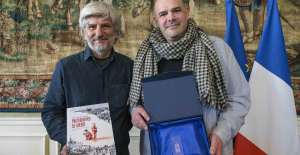Mirai is the Japanese word for future. And so it was fitting that Transport Senator Anjes Tjarks (Greens) was surrounded by 25 Toyota models of the same name when he presented the new plans for faster electrification of taxi fleets in the Hanseatic city on Thursday. The newly licensed taxis were neatly parked at the fish market.
The Toyota Mirai is an electric car that runs on hydrogen. He manages around 500 kilometers with one tank filling. The car is ready to drive again in less than five minutes. For the taxi drivers, whose services can be booked via Free Now, this is a relief compared to the electric cars, whose batteries have to be charged at a charging station. “I don't have to plan an hour or more for the charging process. That's handy,” said one of them at the fish market. And so there could be even more hydrogen taxis on the streets of Hamburg in the future.
"But regardless of whether battery operation or hydrogen - in both cases it is important that the vehicles no longer emit emissions when operated in Hamburg," said Tjarks. So that the Senate is not dependent on taxi companies opting for zero-emission vehicles in the future, it has decided to phase out combustion engines in all types of taxis.
From January 1, 2025, he only wants to register vehicles for passenger transport that are emission-free. In addition to the classic taxis, this also applies to collection services such as Moia or Holon, which, however, already drive electrically or want to do so, but also services such as Uber and providers of shuttle services.
Tjarks calculated that the switch to electric and hydrogen-powered taxis would already save 2,000 tons of CO2 a year. "If we electrify the entire fleet in Hamburg, it's 25,000 tons a year," said the senator. "We hope that this decision in Hamburg will have a signal effect - for Germany and all of Europe."
Hamburg started in 2021 with the “Future Taxi” project to promote the switch to locally emission-free taxis. According to the authorities, more than 350 such cars are currently driving on the streets of Hamburg. "For comparison: in Munich there are 30," said Tjarks. In Hamburg, there were five e-taxis at the beginning of the “Future Taxi” project. The new law should bring a further boost.
The end for combustion engines in taxis is embedded in the new climate protection law, the first draft of which was approved by the Senate on Tuesday. With the draft, Hamburg primarily wants to give legal status to the goal of reducing at least 70 percent of CO₂ emissions by 2030. In order to achieve this reduction, the Senate plans, among other things, to tighten the solar roof obligation that has been in force since the beginning of this year, to introduce a new obligation to green roofs, to switch the heating supply of households to renewable energies - and to promote the electrification of vehicles in the city.
Environment Senator Jens Kerstan (Greens) justified the tightened rules by saying that climate change is happening faster than previously thought. By tightening climate regulations, Hamburg wants to save around three million tons of carbon dioxide by 2030. The new climate protection law is scheduled to come into force at the beginning of 2024. On Tuesday, the Senate started a hearing of the associations.
Not only the environmental organizations are heard, but also the company representatives concerned, such as those from the construction industry and the transport sector. Senator Tjarks, for example, informed the taxi associations on Wednesday evening about the plans to electrify the fleets. There they have been on the way to lower-emission vehicles for years, said Bülent Aktas, Managing Partner of Best Taxi GmbH.
Best Taxi is one of the largest companies in the industry. You currently have 150 taxis, explained Aktas. With the new 25 hydrogen cars, the number of zero-emission vehicles has risen to 65. "Our goal is to make our entire fleet emission-free by the end of the year," explained the taxi operator. We continue to rely on support from the city. For example, the charging infrastructure for e-taxis still needs to be expanded, says Aktas.
Tjarks assured that the Senate is working on it. His authority announced that it would create 40 new e-taxi stands with 80 so-called HPC quick charging points exclusive to the taxis.

 B:SM will break its investment record this year with 62 million euros
B:SM will break its investment record this year with 62 million euros War in Ukraine: when kyiv attacks Russia with inflatable balloons loaded with explosives
War in Ukraine: when kyiv attacks Russia with inflatable balloons loaded with explosives United States: divided on the question of presidential immunity, the Supreme Court offers respite to Trump
United States: divided on the question of presidential immunity, the Supreme Court offers respite to Trump Maurizio Molinari: “the Scurati affair, a European injury”
Maurizio Molinari: “the Scurati affair, a European injury” Beware of the three main sources of poisoning in children
Beware of the three main sources of poisoning in children First three cases of “native” cholera confirmed in Mayotte
First three cases of “native” cholera confirmed in Mayotte Meningitis: compulsory vaccination for babies will be extended in 2025
Meningitis: compulsory vaccination for babies will be extended in 2025 Spain is the country in the European Union with the most overqualified workers for their jobs
Spain is the country in the European Union with the most overqualified workers for their jobs In the United States, a Boeing 767 loses its emergency slide shortly after takeoff
In the United States, a Boeing 767 loses its emergency slide shortly after takeoff The A13 motorway will not reopen on May 1
The A13 motorway will not reopen on May 1 More than 1,500 items for less than 1 euro: the Dutch discounter Action opens a third store in Paris
More than 1,500 items for less than 1 euro: the Dutch discounter Action opens a third store in Paris 100 million euros in loans, water storage, Ecophyto plan… New measures from the executive towards farmers
100 million euros in loans, water storage, Ecophyto plan… New measures from the executive towards farmers New York justice returns 30 works of art looted from Cambodia and Indonesia
New York justice returns 30 works of art looted from Cambodia and Indonesia Les Galons de la BD dedicates War Photographers, a virtuoso album on the Spanish War
Les Galons de la BD dedicates War Photographers, a virtuoso album on the Spanish War Theater: Kevin, or the example of an academic failure
Theater: Kevin, or the example of an academic failure The eye of the INA: Jean Carmet, the thirst for life of a great actor
The eye of the INA: Jean Carmet, the thirst for life of a great actor Skoda Kodiaq 2024: a 'beast' plug-in hybrid SUV
Skoda Kodiaq 2024: a 'beast' plug-in hybrid SUV Tesla launches a new Model Y with 600 km of autonomy at a "more accessible price"
Tesla launches a new Model Y with 600 km of autonomy at a "more accessible price" The 10 best-selling cars in March 2024 in Spain: sales fall due to Easter
The 10 best-selling cars in March 2024 in Spain: sales fall due to Easter A private jet company buys more than 100 flying cars
A private jet company buys more than 100 flying cars This is how housing prices have changed in Spain in the last decade
This is how housing prices have changed in Spain in the last decade The home mortgage firm drops 10% in January and interest soars to 3.46%
The home mortgage firm drops 10% in January and interest soars to 3.46% The jewel of the Rocío de Nagüeles urbanization: a dream villa in Marbella
The jewel of the Rocío de Nagüeles urbanization: a dream villa in Marbella Rental prices grow by 7.3% in February: where does it go up and where does it go down?
Rental prices grow by 7.3% in February: where does it go up and where does it go down? Even on a mission for NATO, the Charles-de-Gaulle remains under French control, Lecornu responds to Mélenchon
Even on a mission for NATO, the Charles-de-Gaulle remains under French control, Lecornu responds to Mélenchon “Deadly Europe”, “economic decline”, immigration… What to remember from Emmanuel Macron’s speech at the Sorbonne
“Deadly Europe”, “economic decline”, immigration… What to remember from Emmanuel Macron’s speech at the Sorbonne Sale of Biogaran: The Republicans write to Emmanuel Macron
Sale of Biogaran: The Republicans write to Emmanuel Macron Europeans: “All those who claim that we don’t need Europe are liars”, criticizes Bayrou
Europeans: “All those who claim that we don’t need Europe are liars”, criticizes Bayrou These French cities that will boycott the World Cup in Qatar
These French cities that will boycott the World Cup in Qatar Tennis: “I need to regain confidence in my body,” explains Rafael Nadal
Tennis: “I need to regain confidence in my body,” explains Rafael Nadal NBA: Orlando returns to level with Cleveland in the 1st round of the play-offs
NBA: Orlando returns to level with Cleveland in the 1st round of the play-offs Tennis: Iga Swiatek in the round of 16 at full speed
Tennis: Iga Swiatek in the round of 16 at full speed “It was exceptional here in Chaban-Delmas”: Escudero looks back on the excitement around France-England
“It was exceptional here in Chaban-Delmas”: Escudero looks back on the excitement around France-England

















